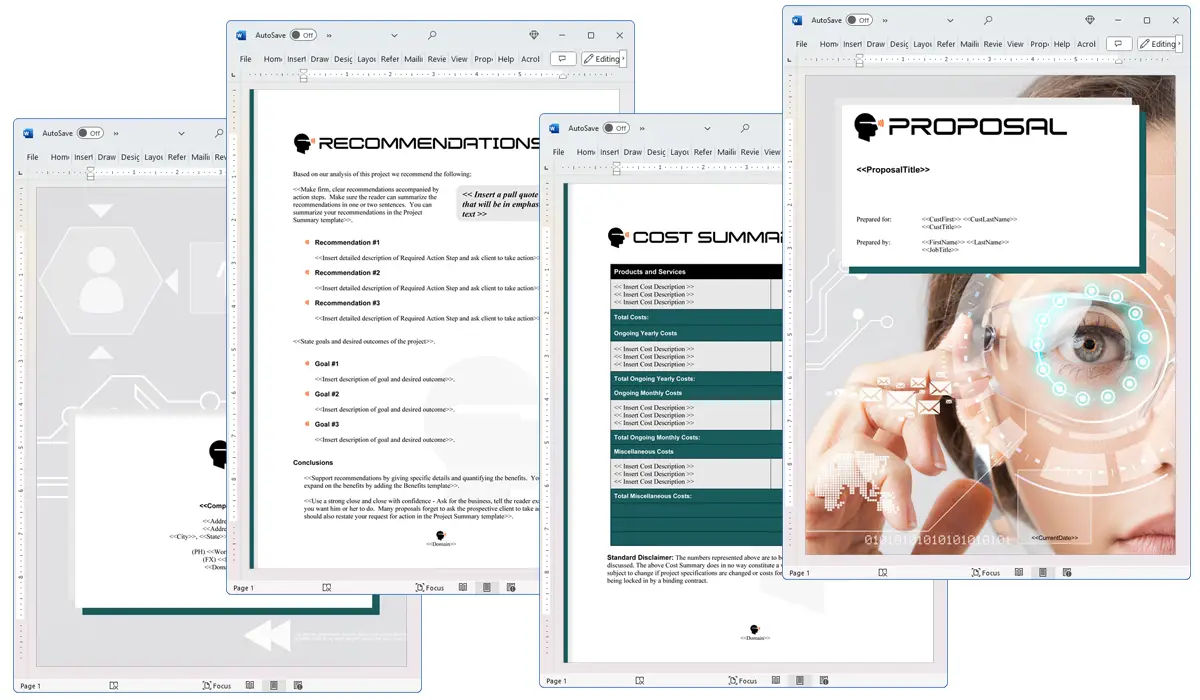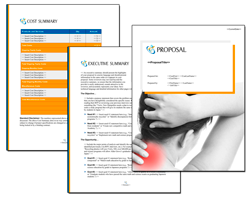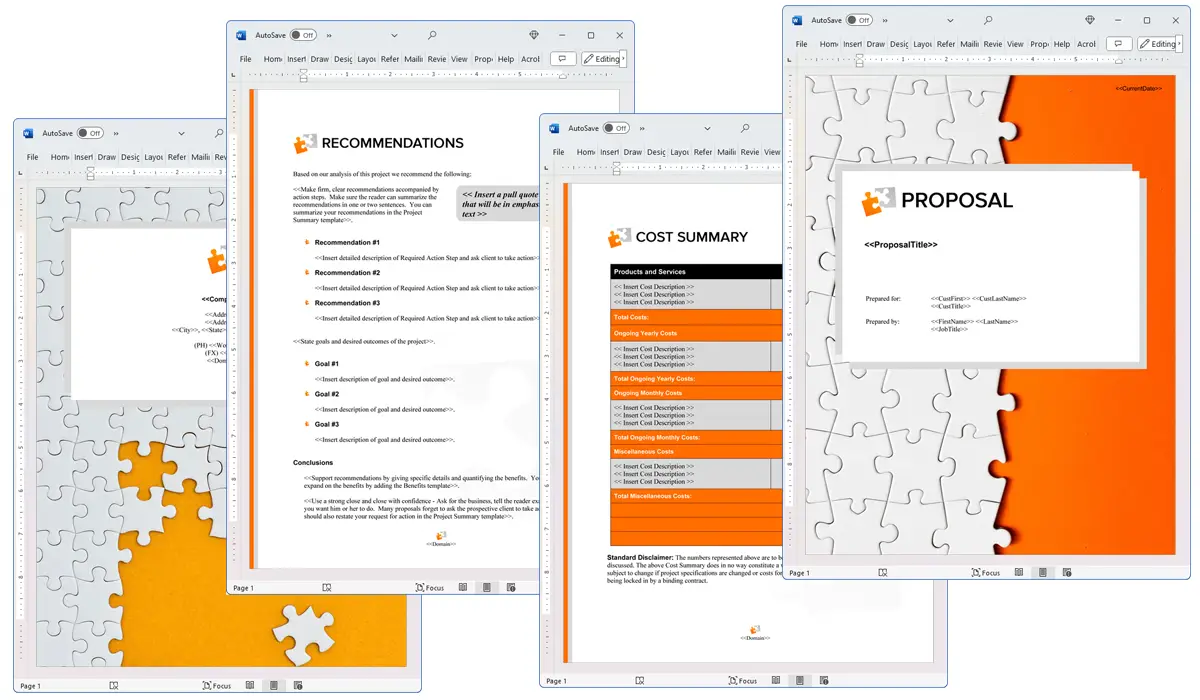What is the Paradigms chapter used for?
Proposal Kit Professional Bundle adds more design themes, all six Contract Packs,
a project management library, and Expert Edition software.

Illustration of Proposal Pack Computers #5
We include this Paradigms chapter template in every Proposal Pack, along with thousands more. You assemble this chapter with others in various combinations to create custom-tailored business proposals, plans, reports, and other documents. Proposal Packs apply custom visual designs to the templates, giving the final documents a consistent professional finish.
 DOWNLOADABLE, ONE-TIME COST, NO SUBSCRIPTION FEES
DOWNLOADABLE, ONE-TIME COST, NO SUBSCRIPTION FEES
Overview of the Paradigms Chapter
In the field of business proposals, clarity and persuasion are paramount. The Paradigms chapter plays an important role in achieving these objectives by helping to set the conceptual framework for the proposal. This chapter is used to describe the established standards, models, or patterns within a particular field that are relevant to the project or proposal at hand. By discussing paradigms, you can illustrate how your proposed approach aligns with or diverges from existing standards, thereby providing a solid foundation for understanding the merits and innovativeness of your proposal.
How is the Paradigms Chapter Used?
The Paradigms chapter is typically employed in a proposal to demonstrate a deep understanding of the industry standards and to position the proposal withconsidering the situation of these standards. It serves as a benchmark against which the proposed project can be compared, highlighting how it either adheres to or innovates beyond the current paradigms. This helps decision-makers see the value of the proposal in a broader industry context, enhancing the persuasive power of the document.
What is Included in the Paradigms Chapter?
When drafting the Paradigms chapter, several elements are typically included:
- Definition of Relevant Paradigms: This section outlines the current models or standards in the industry that are relevant to the proposal.
- Comparison and Contrast: Here, the existing paradigms are compared with the approach proposed, noting the similarities and differences.
- Success Stories: Instances where following or diverging from established paradigms led to success can be highlighted to strengthen the argument.
- Rationale for Paradigm Selection or Deviation: This explains why adhering to or deviating from established paradigms is beneficial for the specific project.
These components work together to provide a comprehensive overview of how the proposed project relates to standard industry practices.
Use Case Examples for the Paradigms Chapter
- Technology Proposals: Demonstrating how a new software tool aligns with digital transformation paradigms in IT.
- Educational Initiatives: Showcasing a new teaching method that diverges from traditional educational paradigms to offer improved learning outcomes.
- Healthcare Services: Comparing a new patient care model to existing healthcare delivery paradigms to highlight efficiency or effectiveness.
- Environmental Projects: Discussing how a green initiative supports the sustainable development paradigms accepted in environmental policy.
- Marketing Strategies: Aligning a novel marketing campaign with the current paradigms in digital advertising to show potential for higher engagement.
Key Takeaways
- The Paradigms chapter is important for placing a proposal withconsidering the situation of industry standards.
- It helps demonstrate the proposal's adherence to or deviation from accepted models and patterns.
- Including definitions, comparisons, success stories, and rationales makes the chapter informative and persuasive.
- This chapter enhances the proposal's credibility by showing awareness of and respect for established practices.
- Paradigms can apply to various fields, making this chapter and adaptable to different types of proposals.

Illustration of Proposal Pack Healthcare #6
 What Our Clients Say
What Our Clients SayMany thank for such amazing templates you created for us. I purchased the best for my business."
 4.7 stars, based on 849 reviews
4.7 stars, based on 849 reviewsRelated Chapters

The Paradigms chapter and other chapters are integrated into a Word document as illustrated here in the Proposal Pack Concepts #15 design theme. There are hundreds of design themes available, and every design theme includes the Paradigms chapter template.
A proper business proposal will include multiple chapters. This chapter is just one of many you can build into your proposal. We include the complete fill-in-the-blank template in our Proposal Pack template collections. We also include a library of sample proposals illustrating how companies in different industries, both large and small, have written proposals using our Proposal Packs. This template will show you how to write the Paradigms.
We include a chapter library for you to build from based on your needs. All proposals are different and have different needs and goals. Pick the chapters from our collection and organize them as needed for your proposal.
Using the Proposal Pack template library, you can create any business proposal, report, study, plan, or document.
The Wizard software includes an AI Writer, which will write the content of this and any other chapter of your document. Use the AI Writer to do the heavy lifting, writing the first draft of your proposal or business document in minutes.
 Ian Lauder has been helping businesses write their proposals and contracts for two decades. Ian is the owner and founder of Proposal Kit, one of the original sources of business proposal and contract software products started in 1997.
Ian Lauder has been helping businesses write their proposals and contracts for two decades. Ian is the owner and founder of Proposal Kit, one of the original sources of business proposal and contract software products started in 1997.By Ian Lauder
 Published by Proposal Kit, Inc.
Published by Proposal Kit, Inc.


 Cart
Cart
 Facebook
Facebook YouTube
YouTube Bluesky
Bluesky Search Site
Search Site